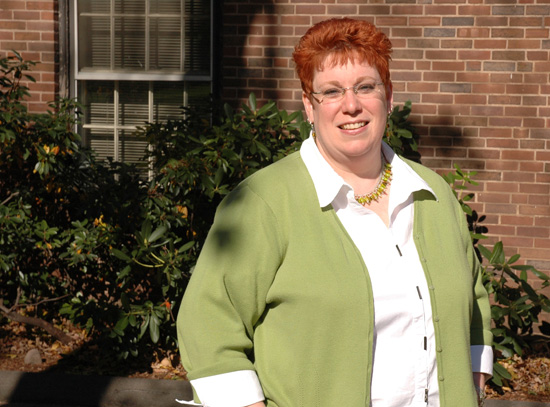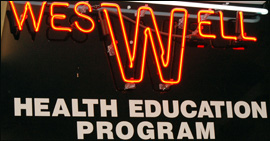WesWELL Director Promotes Prevention
 |
| Lisa Currie, director of health education at WesWELL, promotes mindfulness and responsibility in all areas of health and wellness in order to prevent disease, injury and other health problems. |
| Posted 11/01/06 |
| Q: Lisa, the Davison Health Center is home to three health-related offices, WesWELL, Health Services and the Office of Behavioral Health. How do these divisions differ?
A: WesWELL is the health education office so we focus on prevention education on health issues relevant to college students. Health Services is our medical clinic, which provides treatment and preventative care for illness, injury, sexual health, travel consults and such, while the Office of Behavioral Health for Students offers confidential mental and emotional health support. We like to consider the Davison Health Center one stop shopping for our students health needs! Q: As the director of health education, which division do you oversee, and how long have you worked in this position? A: I have overseen WesWELL since I joined Wesleyan in July 2000. And as the sole professional staff member in the office, I sometimes joke that I am WesWELL, though of course thats not true I supervise a great group of students who round out the staffing.
A: Our mission is to promote mindfulness and responsibility in all areas of health and wellness in order to prevent disease, injury and other health problems. We strive to promote good health of mind, body and spirit by helping members of the Wesleyan community, particularly students, connect with resources and gain knowledge that will aid in the enhancement of their well-being, encourage self-discovery, and support their intellectual proficiency and academic success. Q: Do you meet with students one-on-one or what is your interaction with them? A: I do meet with students one-on-one, but more often I lead workshops or discussions with groups and work with student peer educators who then go on to create their own outreach efforts. If I do meet with an individual student, it might be to help a Residence Life staff member with programming ideas, to assist a student who is looking for resources or ideas on a health issue or even as a judicial referral for an alcohol violation. Q: In addition to offering health education programs, how does WesWELL help students? A: The Peer Health Advocates and I reach out to students in a variety of ways workshops are just one method. We might sponsor an outside speaker or provide a training to help students build new skills. I also sponsor a number of non-credit fitness classes for students and employees every semester. Students who drop by the office will also find we have a health resource library with books, videos, journals, periodicals, and brochures that address many different issues. We even advocated for changes to campus policy and practices to help create a healthier environment for students. The most notable example of this is the implementation of smoke-free residential living areas in 2002. The Peer Health Advocates lead the effort and the policy was implemented the following academic year. Q: What are typical concerns or questions students have when they visit the WesWELL office? A: It really varies. Since we address a wide range of issues, it could be a student who has a concern about a friend who is engaging in risky drinking behaviors or who is seeking funding for an event on breast cancer awareness or who is simply looking for information for eating more healthfully. But truthfully, the thing that gets students in our office most often is the free safer sex supplies. Though, most of our traffic is not from office visits we have much more contact with students outside the office through our outreach programs and such. I also answer a large number of phone and email questions from student each week as well. Q: What are a few examples of the non-credit classes you offer and where is this information available? A: WesWELL started offering yoga classes to students sometime in the 1990s, long before my arrival. We continue to offer yoga, along with meditation, tai chi, kung fu, and our most recent addition, cardio kickboxing. About 125 to 150 people enroll each semester. All the details can be found on the WesWELL website at www.wesleyan.edu/weswell. Online registration runs in the early weeks of each semester. Q: What is the Student Health Advisory Committee and what is your involvement with them? A: SHAC is a committee of students who help advise Health Services, and my office to a lesser extent, on what are current issues of concern amongst students and how we can better serve those needs. It is co-chaired by Joyce Walter, director of Health Services, and Jeff Walker, a student. I sit on the committee and assist the group in the outreach efforts they create to educate the student body on available services and health issues. Q: What are a few recent examples of WesWELL-coordinated events? A: The Sexual Health Expo is ours. It was the brainchild of Joshua Pavlacky, one of my Peer Health Advocates. He envisioned a fun, safe, educational environment where students could learn about all aspects of sexual health and I think weve been fairly successful in creating that. Other than that, we dont have too many recurring events since the health needs of students change continually. We typically collaborate with Health Services and Behavioral Health to offer a series of discussions and workshops throughout the year. An example is a recent presentation by Davis Smith, our medical director, on the new HPV vaccine and changes to the availability of emergency contraception. We also have collaborated with Aramark the last couple years on a multi-part Feed Your Brain series on healthy eating and cooking to help students eat better. Q: What are your degrees in and from where? A: I earned my B.A. in journalism from the University of Wisconsin Eau Claire and my M.S. in Education College Student Development from the University of Wisconsin LaCrosse. Thats not what most people would consider a very traditional path into college health education, but its worked for me! Q: Youve spoken at numerous colleges and conferences including Connecticut College, Trinity College and University of Connecticut with a program titled Coming Out of the Fridge. Please explain what this program is about. A: I started speaking about my experience with compulsive eating about four years ago, partly to educate about this less-talked-about eating disorder but also to help myself in my ongoing recovery and healing. I use my personal experience to illustrate the facts about this disorder. I get a great deal of satisfaction from public speaking and having the chance to impact the audience with my words and experiences. Im realistic enough to know it may not be life-altering hearing me speak, but it might be what encourages someone to get help for themselves or someone they love. Q: What are your personal goals as a health educator working with college students? A: I often say to students I want to help you put the tools in your toolbox that you need to be healthier. So to me, health education is all about skills development and knowledge building. Its also about helping students learn how to critically examine their choices around their health and striving to make choices that will help them succeed at a higher level both inside and outside the classroom. Q: If anyone has a question about WesWELL, how do they get in contact with the office? A: WesWELL is located on the second floor of the Davison Health Center at 327 High Street. Students can stop by Monday through Friday 9am to 5pm or evenings by request. They can also contact me at 860-685-2466 or e-mail lcurrie@wesleyan.edu. Our web site is http://www.wesleyan.edu/weswell/. |
| By Olivia Drake, The Wesleyan Connection editor |


 Q: What is the mission of WesWELL?
Q: What is the mission of WesWELL?